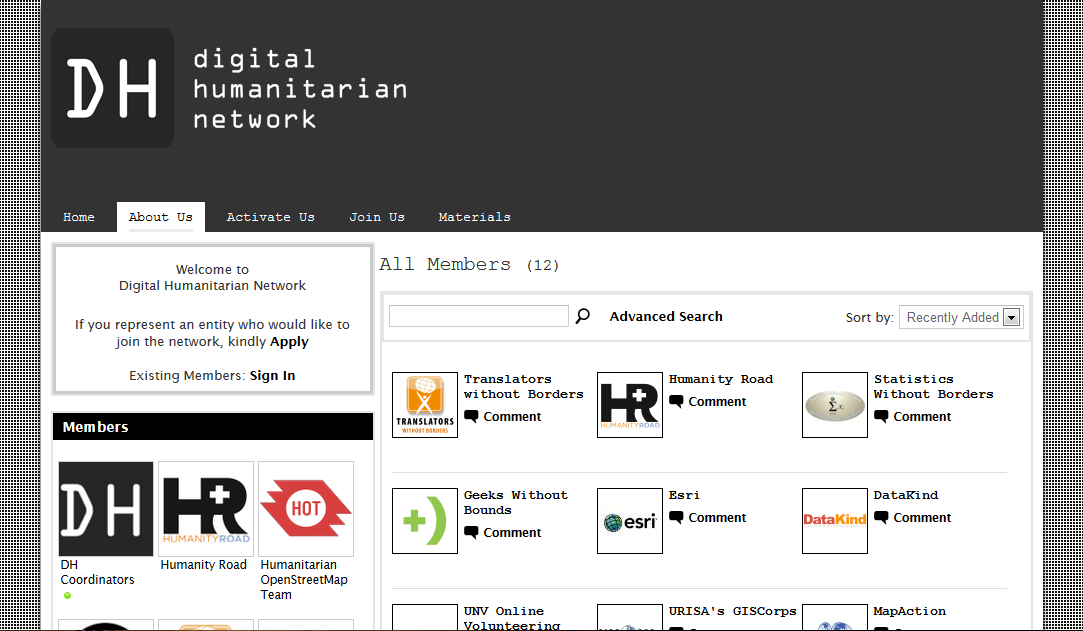critically-informed humanitarianism
I have a few thoughts to semi-coherently dump into a post while they’re on my mind. First, the background. One component of my fieldwork so far has involved trying to become a member of the crisis mapping community. Someone the other day pointed out that this is semi-anthropological, and they were right. I’m digging deep into digital humanitarianism to  understand it from the outside, but also on a few levels actively participating in it. I’m trying to figure out the language, the metaphors, the ideas that circulate in the community, and I’m doing this by working my way into that community. For instance, I’m collaborating with some amazing people on a digital volunteer project impact evaluation framework (read about digital volunteers here and here ), contributing to crowdsourced data processing, and talking to more and more of the leaders of the community. I’m not just watching people do these things, but actively participating in them.
understand it from the outside, but also on a few levels actively participating in it. I’m trying to figure out the language, the metaphors, the ideas that circulate in the community, and I’m doing this by working my way into that community. For instance, I’m collaborating with some amazing people on a digital volunteer project impact evaluation framework (read about digital volunteers here and here ), contributing to crowdsourced data processing, and talking to more and more of the leaders of the community. I’m not just watching people do these things, but actively participating in them.
I’ve read way more than enough critical literature to problematize every step of what I’m doing through-and-through. But it seems there are few ways to really, really understand a community other than becoming a member of it and understanding what that entails.
And I’ve begun to question what my role as an academic scholar is in my humanitarian activities. What do we as critically-minded scholars do when we “look at” humanitarianism? Do we simply critique? Do we simply “try to understand”? To “situate”? Those are some of the rhetorical questions that have been bugging me lately, but a smaller, easier-to-manage question is: are there scholars who are trying to bridge the gap between critical theoretical scholarship and humanitarian practices? Is there any scholarly interest in using critically-informed ideas to “improve” humanitarian practice, or to try to ameliorate some of the impacts of its complex problematic nature?
Much of the inspiration for my mode of participant-observation comes from stuff written by Michael Burawoy, Mitchell Duneier, and Barbara Ehrenreich. Burawoy wanted to understand post-colonial Zambianization and the management of labor, so he traveled to

Zambia and managed labor. He has also worked in steel mills and copper mines. Duneier wanted to understand the sociology of sidewalk vendors in New York, so he became a sidewalk vendor. Ehrenreich wanted to understand how people live on minimum-wage jobs, so she worked in minimum-wage jobs for a year (I think it was a year, but I don’t have the book in front of me). Although this method in some ways resembles the terribly problematic form of anthropology where the white academic would “penetrate” an indigenous community and behave as if they had abandoned power relations and could be an objective member of that community, what I’m doing is quite different. Along the lines of the authors above, I don’t imagine that politics are separate from my scholarship, or that I abandoned power relations upon “entering the field”. I have a long-term interest in contributing to the digital humanitarianism community.
And that’s where my question comes from. What are the prospects for critical contributions to humanitarianism? Can we “improve” it in the areas where it can be improved (and perhaps abandon it where it should be abandoned), while at the same time acknowledge the problematic nature of some of the things we do? Is it possible to contribute to the field you’re simultaneously trying to understand/situate/critique? If so, how does one consider the impact they’ve had on the very thing they’re observing?
These are some of the questions in the back of my mind…

